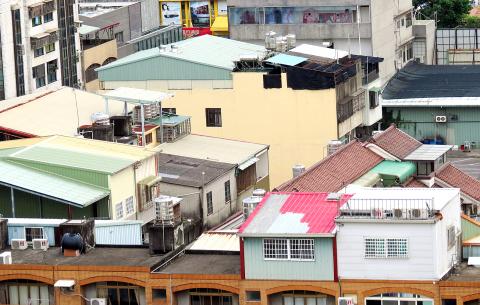The Taipei City Government yesterday brushed aside criticism that a new rule targeting illegal structures on new homes would overwhelm the city agencies tasked with completing inspections and delay the completion of property transactions.
The rule, which came into effect this month, stipulates that people whose properties have rooftop additions, mezzanines or enclosed balconies must have these features removed before they can sell their houses. It applies to all homes in buildings which received licenses issued from Tuesday last week.
Under the rule, inspectors from the Taipei City Construction Management Office are to examine a property within two weeks of its deed being registered for transfer to make sure that there are no such structures.

Photo: Chang Ching-ya, Taipei Times
The policy drew criticism from real-estate analyst Huang Chia-chin (黃家進), who on Tuesday called the new measure a “nuisance.”
He said that at least 40,000 properties are sold in Taipei every year, and construction companies and city officials would be overwhelmed if every property had to gain a certificate guaranteeing that it did not have any illegal structures.
In addition, as a transaction usually takes about 40 days to complete, and it usually takes 30 days for construction companies to issue certificates, people would have to wait 70 days before a transaction could be completed, he said.
“This will seriously hold up transactions and lead to real-estate market stagnation,” Huang said.
Taipei Office of Illegal Building Control Section Chief Hung Te-hao (洪德豪) said that the city government has enough staff to enforce the new rule, adding that the policy was introduced following an assessment of the agency’s workload.
People do not need to wait for certificates to be issued before putting their homes on the market, he said, as the two processes can be carried out simultaneously and the procedure therefore would not be as lengthy as Huang claimed.
Property owners are encouraged, not required, to provide certificates signed by building companies to prove that their home is free of violations and the city government would grant house owners a subsidy of NT$3,000 toward the cost of each certificate, he said.
Those who opt to bypass the certification process, but are found to be in possession of illegal structures would be required to have the illegal features torn down before a sale can be approved, Hung said.
Meanwhile, Taipei Mayor Ko Wen-je (柯文哲) expressed confidence about the policy’s viability.
Responding to reporters’ queries, he said that the policy was implemented after careful deliberation.
“The rule has undergone much internal review, has its own budget and its enforcement rules have all been confirmed. So it is a workable rule,” Ko said.
He said that the policy is aimed at capping the number of illegal structures in the capital.
“There are too many old illegal structures that cannot be dealt with. Let bygones be bygones. Form now on, all new buildings will go by this rule,” he said.

NEXT GENERATION: The four plants in the Central Taiwan Science Park, designated Fab 25, would consist of four 1.4-nanometer wafer manufacturing plants, TSMC said Taiwan Semiconductor Manufacturing Co (TSMC, 台積電) plans to begin construction of four new plants later this year, with the aim to officially launch production of 2-nanometer semiconductor wafers by late 2028, Central Taiwan Science Park Bureau director-general Hsu Maw-shin (許茂新) said. Hsu made the announcement at an event on Friday evening celebrating the Central Taiwan Science Park’s 22nd anniversary. The second phase of the park’s expansion would commence with the initial construction of water detention ponds and other structures aimed at soil and water conservation, Hsu said. TSMC has officially leased the land, with the Central Taiwan Science Park having handed over the

The Philippines is working behind the scenes to enhance its defensive cooperation with Taiwan, the Washington Post said in a report published on Monday. “It would be hiding from the obvious to say that Taiwan’s security will not affect us,” Philippine Secretary of National Defense Gilbert Teodoro Jr told the paper in an interview on Thursday last week. Although there has been no formal change to the Philippines’ diplomatic stance on recognizing Taiwan, Manila is increasingly concerned about Chinese encroachment in the South China Sea, the report said. The number of Chinese vessels in the seas around the Philippines, as well as Chinese

AUKUS: The Australian Ambassador to the US said his country is working with the Pentagon and he is confident that submarine issues will be resolved Australian Ambassador to the US Kevin Rudd on Friday said that if Taiwan were to fall to China’s occupation, it would unleash China’s military capacities and capabilities more broadly. He also said his country is working with the Pentagon on the US Department of Defense’s review of the AUKUS submarine project and is confident that all issues raised will be resolved. Rudd, who served as Australian prime minister from 2007 to 2010 and for three months in 2013, made the remarks at the Aspen Security Forum in Colorado and stressed the longstanding US-Australia alliance and his close relationship with the US Undersecretary

‘WORLD WAR III’: Republican Representative Marjorie Taylor Greene said the aid would inflame tensions, but her amendment was rejected 421 votes against six The US House of Representatives on Friday passed the Department of Defense Appropriations Act for fiscal 2026, which includes US$500 million for Taiwan. The bill, which totals US$831.5 billion in discretionary spending, passed in a 221-209 vote. According to the bill, the funds for Taiwan would be administered by the US Defense Security Cooperation Agency and would remain available through Sept. 30, 2027, for the Taiwan Security Cooperation Initiative. The legislation authorizes the US Secretary of Defense, with the agreement of the US Secretary of State, to use the funds to assist Taiwan in procuring defense articles and services, and military training. Republican Representative